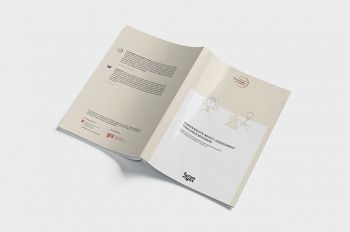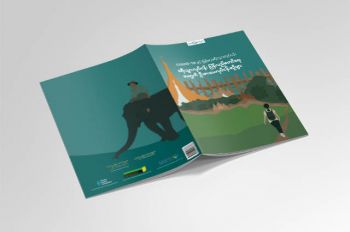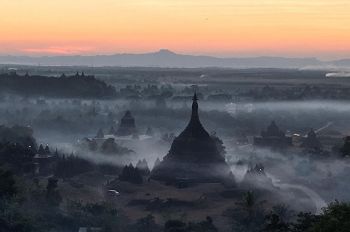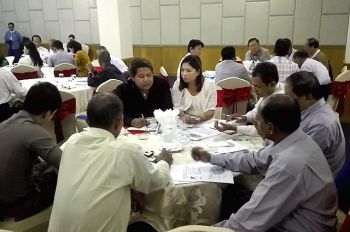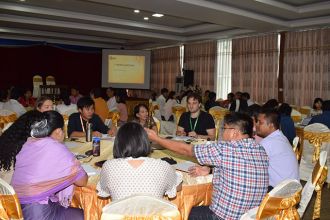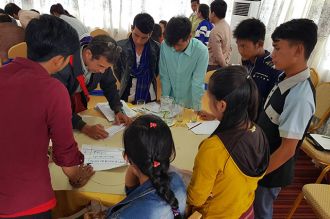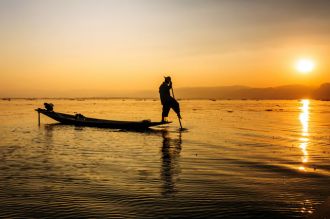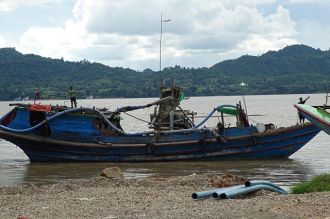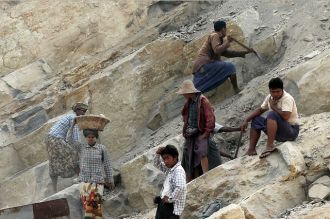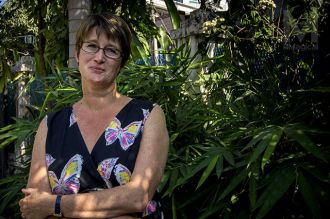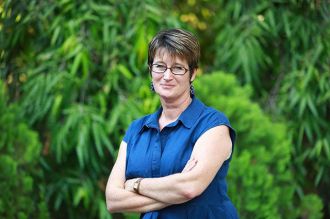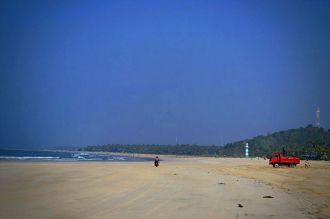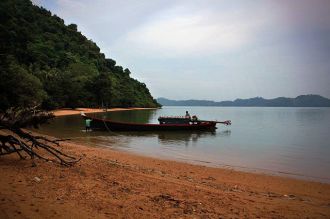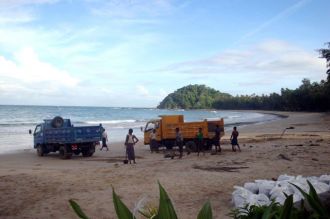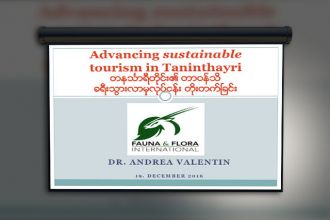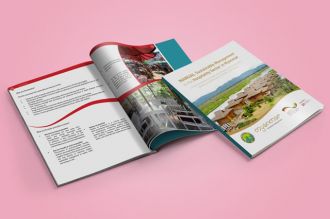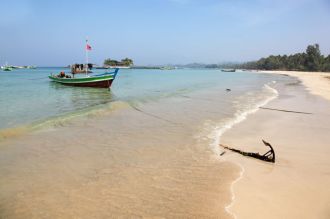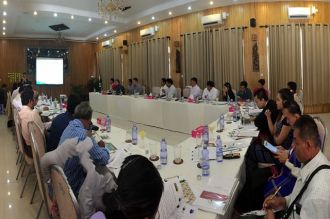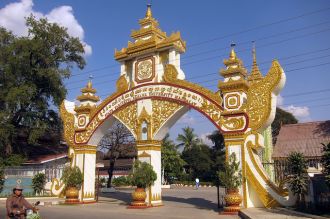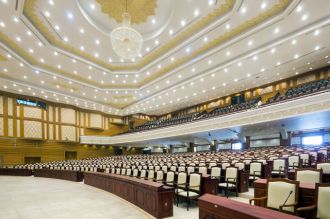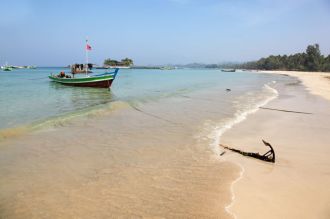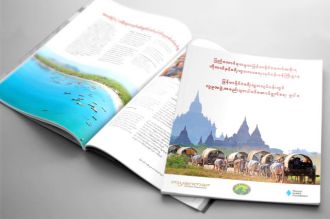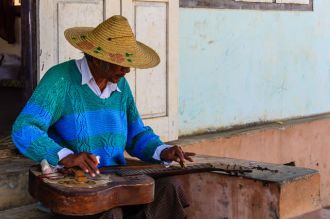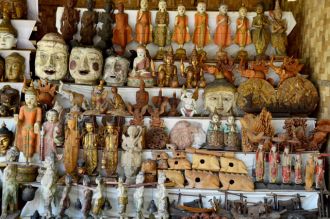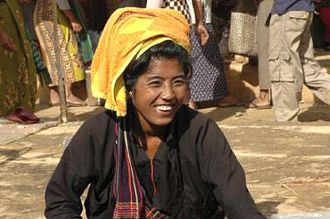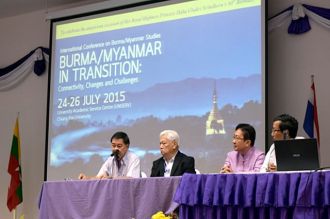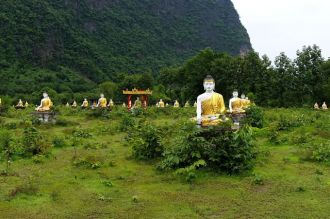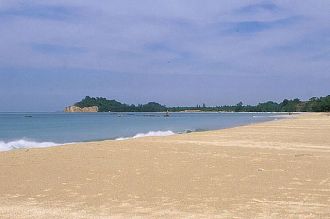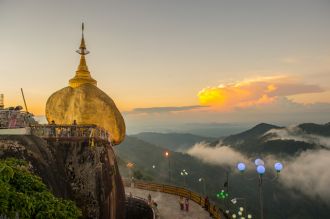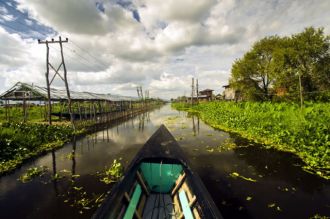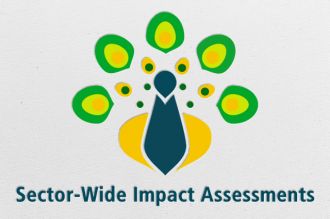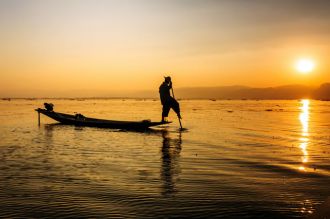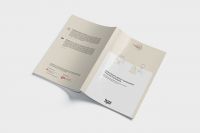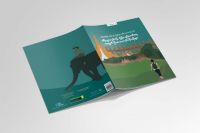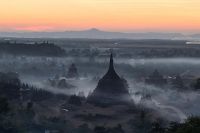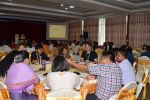Tourism Sector

The Sector Wide Impact Assessment (SWIA) on Tourism in Myanmar was the second SWIA undertaken by MCRB, with guidance from the Danish Institute for Human Rights (DIHR). A SWIA is a forward-looking assessment that aims to contribute to preventing and minimising the sector’s negative impacts as well as strengthening and improving the sector’s positive impacts.
Field research took place in 2013/2014 in six tourism destinations across Myanmar.
The Myanmar Tourism SWIA put detailed information on potential impacts of the sector into the public domain for uptake and use by a wide range of audiences. It assessed not only localised and cumulative impacts on individuals and groups that may arise from tourism in specific locations, but also the sector’s potential impacts on Myanmar society as a whole and the choices to be made.
This was important in 2015 because:
-
Myanmar was facing a rapid increase in tourist arrivals which had the potential to create significant positive impacts for job creation and poverty alleviation. However, some of Myanmar’s flagship sites such as Bagan, Inle and Kyaiktiyo, were already under environmental and social pressure from the effects of tourism, which was affecting the livelihoods of local inhabitants and long-term viability of these places as tourism destinations.
-
Even though the country was emerging from decades of ethnic conflict, authoritarian rule and economic isolation it is, and will remain for some time, a high-risk country with poor governance. An understanding of the potential impacts of the sector is necessary to improve the outcomes for Myanmar and its people.
-
Responsible business conduct in the Tourism sector in Myanmar therefore required heightened human rights due diligence to determine what impacts business activities may have on society, including on human rights. This must include robust approaches to managing those impacts. The Tourism SWIA was intended to be a resource for these efforts.
The SWIA made recommendations to government, businesses, civil society groups, tourists and other stakeholders intended to increase positive impacts and reduce negative impacts, building on the framework of the existing government policy on Responsible Tourism (2012). The recommendations were directed towards government, businesses (and investors in those business), civil society, tourists, the Myanmar National Human Rights Commission and development partners for Myanmar, and were intended to support wider multistakeholder collaboration.
A supplement to the Myanmar Centre for Responsible Business’ (MCRB) Tourism Sector-Wide Impact Assessment outlined the initiatives to promote responsible tourism in Myanmar in 2015 being pursued by other organisations:
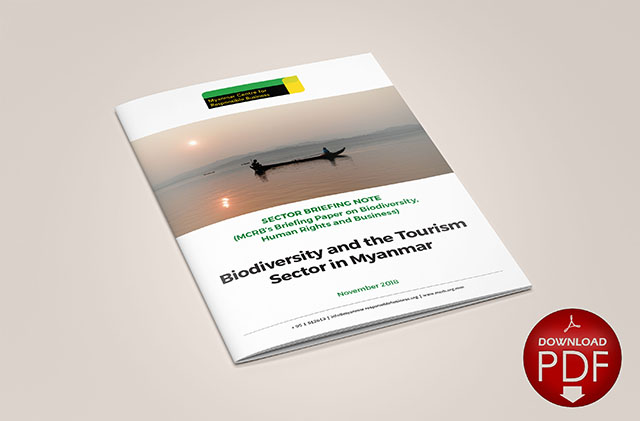
Drawing on the SWIA findings, international standards, and follow-up multistakeholder discussions, a Sector Briefing Note on Biodiversity and Tourism was prepared as a supplement to MCRB’s series of 2018 publications on Biodiversity, Business and Human Rights.
MCRB highlighted a number of issues relating to environmental damage by tourism, or which would undermine prospects for tourism. This included river, seabed and beach sand mining. MCRB conducted advocacy on this with national and local governments between 2015 and 2018 particularly relating to sand mining in Ngwesaung, Ngapali and Tanintharyi.
Other topics of concern were inadequate waste management in tourist destinations - this was a major topic of focus in Ngapali during meetings in 2016 and 2017 – and ‘hotel zones’, often associated with land grabs.
Following the SWIA, MCRB partnered with Hanns Seidel Foundation, and the newly formed Myanmar Responsible Tourism Institute (MRTI) to co-organise a number of multistakeholder discussions in existing and emerging tourism destinations. Four annual National Communities and Tourism Conferences were held in Naypyidaw (2015 and 2017), Kalaw (2018) and Loikaw (2019). These particularly focussed on making a reality of Community Involvement in Tourism (CIT) (2017).
These events provided opportunities to discuss and promote the many other research, initiatives and guidance being undertaken and contextualised for Myanmar on topics such as conflict sensitivity, hotel sustainability practices, and preventing orphanage tourism.
Other existing and emerging tourism destinations on which MCRB focussed with partners included Tanintharyi Region, Mon and Kayin States (Hpa-an, and Thandaungyi), and Rakhine (Ngapali and Mrauk U). The tourism potential of Rakhine was the subject of a briefing in 2017 to the Rakhine Advisory Commission led by Kofi Annan, as well as follow up work in 2019 on Mrauk U in support of its planned UNESCO World Heritage listing.
In December 2016 in Dawei, and in May 2017 in Myeik and Kawthaung, MCRB together Fauna and Flora International held extensive discussions with stakeholders in Tanintharyi Region to discuss spatial planning of tourism and other activities in this environmentally sensitive region and jointly presented findings to the Ministry and the Tanintharyi Tourism Development Committee in 2017.
MCRB and partners also did extensive advocacy to government and parliament on the draft Tourism Law between 2016 and 2018, as well as on related issues such as Hotels Policy, Community involved Tourism, and Ecotourism. The impacts of tourism featured in MCRB’s advocacy and training on effective implementation of the 2015 EIA Procedures, including the need for tourism sector guidelines, and the 2017 draft public participation guidelines.
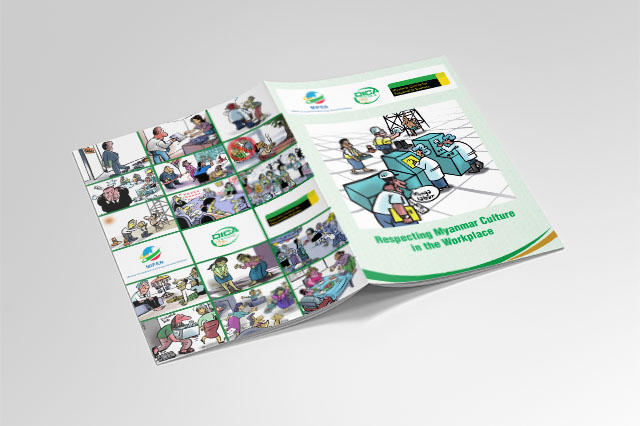
In 2019, MCRB published a Guide to Respecting Myanmar Culture in the Workplace together with the Myanmar Investment Commission and DICA. The guide, which was inspired by ‘Dos and Don’ts for Tourists in Myanmar’ is available in English, Myanmar, Chinese and Japanese. A Russian version, not published by MCRB, is in circulation.
During the COVID pandemic in 2020, MCRB, HSF and MRTI worked closely with the government and other tourism stakeholders to identify options for safe tourism and post-pandemic recovery and contributed to a White Paper. However, the 1 February 2021 put paid to further work in the sector, as well as severely damaging its chances of recovery, even post-pandemic.
Information about MCRB’s activity in the tourism sector during the period 2013-2020:
New Report and Upcoming Webinar on Human Rights in Tourism
Win Min of MCRB contributed to the Human Rights Impact Assessment (HRIA) undertaken in Myanmar (and Thailand) in 2019 by the Roundtable - Human Rights in Tourism...
White Paper on Tourism in Myanmar
Myanmar Tourism Marketing (MTM) held a series of online panel dialogues and discussions entitled “The COVID-19 Wave and Myanmar’s Tourism Industry,” in May 2020 in which MCRB’s Senior Programme Associate Win Min participated.
Planning for a Brighter Future in Mrauk U: Cultural Heritage and Tourism Management
On 10/11 July, MCRB and UNESCO Myanmar office facilitated a multistakeholder discussion on sustainable management of tourism in Mrauk U at Sedona Hotel Yangon.
SMEs in Mon and Kayin State Want Less Red Tape, Fewer Committees, and Clear Procedures and Fees
On 2 and 3 July, MCRB, together with the UN Development Programme (UNDP) as part of the FairBiz programme supported by the UK FCO Prosperity Fund, organised day long training and consultation workshops for local businesses.
4th National Conference on Communities and Tourism 2019
Community-centred planning, multi-stakeholder coordination and transparency needed to ensure responsible tourism development in regions
Strengthening Public Understanding Of Environmental Impact Assessment
MCRB worked with Vermont Law School (supported by Heinrich Boll Stiftung), in cooperation with the Environmental Conservation Department (ECD) of MONREC, and local civil society networks, to hold workshops in Mandalay, Monywa, Taunggyi and Loikaw.
Myanmar Parliament Passes Tourism Law
Myanmar Centre for Responsible Business (MCRB) has conducted a Sector Wide Impact Assessment (SWIA) highlighting the issues and the challenges of the Tourism Industry.
River Sand Extraction in Myanmar
Bethia Kadoe was attached for a month in 2017 as an intern with MCRB, and worked in collaboration with WWF to study river sand mining in the Ayeyarwady/Yangon area. This is her paper from her research.
Experts object to firms’ plans to mine sand in Tanintharyi Region
A local company plans to extract 5 million cubic metres of sand over five years in sensitive coastal areas in Tanintharyi Region without legally-required environmental assessments.
Third National Conference on Communities and Tourism Focusses on Local Level Destination Management
Over 200 participants from government, private sector, local community-based tourism (CBT) organisations, development partners and independent experts attended the 3rd National Conference on Communities and Tourism in Kalaw from 6-8 June.
Magical Myanmar Travel Magazine Interviews Vicky Bowman
The Myanmar Centre for Responsible Business published a sector-wide impact assessment on tourism in 2015, and has since co-hosted a number of multistakeholder discussions on responsible tourism and community based tourism. What does Ecotourism mean?
MCRB director discusses Myanmar FDI and development in light of the Rakhine crisis
Mizzima’s Aung Thura sat down with MCRB Director Vicky Bowman to discuss the FDI, development in light of the Rakhine crisis.
Do No Harm: A Toolkit for the Tourism Industry
This Do No Harm toolkit has been developed for businesses, not-for-profit and government organisations that directly or indirectly supply goods or services to the tourism, travel and hospitality industries.
MCRB Discusses Beach Sand Mining in Ngwesaung with Pathein Township Officials
On 20 June, Vicky Bowman, Director, and Wai Phyo Myint, Regional Outreach Manager visited Pathein for a discussion of the problems of beach sand mining in Ngwesaung.
Representatives of over 30 Myanmar Community Tourism Initiatives Update Progress and Share Experiences at 2nd National Conference
MCRB, Myanmar Responsible Tourism Initiative (MRTI) and Hanns Seidel Foundation (HSF) cohosted a second Communities and Tourism Conference in Naypyidaw on 13/14 June.
MCRB and Fauna and Flora International co-host a week of Tanintharyi Tourism workshops
MCRB and FFI held a week of multi-stakeholder workshops on sustainable tourism in Tanintharyi with a two day discussion focussed on Myeik District at the J&J Hotel on 15/16 May attended by around 60 local people involved in the tourism industry.
Time for an Action Plan for a Trash-Free Ngapali
Myanmar Centre for Responsible Business (MCRB), Hanns Seidel Foundation (HSF) and Myanmar Responsible Tourism Institute (MRTI), co-hosted a second multistakeholder workshop on sustainable tourism in Ngapali from 8-9 May 2017.
Developing Sustainable Tourism in the Myeik Archipelago and Tanintharyi Region
Vicky Bowman delivered a presentation on sustainable tourism and Tanintharyi at the 6th Working Group for Development Partners on Tourism at Sedona Hotel, Yangon on 24 March 2017.
MCRB Briefs Rakhine Advisory Commission on Prospects for Responsible Investment in Rakhine State
Members of the Rakhine Advisory Commission invited MCRB and other non-governmental and civil society organisations to brief them on economic opportunities and challenges in Rakhine State on 16 January prior to their visit to Kyaukphyu.
MCRB and Flora & Fauna International co-Host Multi-Stakeholder Workshop on Sustainable Tourism in Tanintharyi Region
MCRB and FFI co-hosted a two-day multistakeholder workshop on sustainable and responsible tourism in Tanintharyi, over two days in Dawei on 19 and 20 December.
The draft tourism law: Fit for purpose?
Further changes are needed to the Ministry of Hotels and Tourism’s latest draft to ensure the new law meets the sector’s needs and guides sustainable development.
Hotel Policy is Broken: Here’s How to Fix It
Myanmar’s Tourism Sector will benefit in the long run if officials spend more time managing destinations and less protecting existing hotels, and instead lets the market decide which properties succeed or fail.
Manual on Sustainable Management in the Hospitality Sector in Myanmar
GIZ, together with the Ministry of Hotels and Tourism and Myanmar Tourism Federation, has produced an English and Burmese language Manual on Sustainable Management in the Hospitality Sector in Myanmar intended for hotels.
Environment is Top Concern for Sustainable Tourism in Ngapali
Hanns Seidel Foundation (HSF) and Myanmar Centre for Responsible Business (MCRB), co-hosted the first ever multistakeholder workshop on responsible tourism in Ngapali from 11-13 May 2016.
Companies Discuss the Challenges of Doing Business Responsibly in SouthEast Myanmar
MCRB, Peace Nexus and Kaw Lah Foundation co-hosted a workshop on Responsible Business in Hpa-An, Kayin State, on 3-4 March, 2016. The workshop brought together representatives of around 13 companies from the area as well as staff of Kaw Lah Foundation.
MRCB Discusses Responsible Business with Universities in Mandalay
MCRB gave talks on 2nd and 3rd February to Yadanabon University (Mandalay) and Mandalay University students and faculty from a wide range of disciplines including Anthropology, History, Archaeology. Geology, Zoology and Botany.
Fine Line between FOC and Corruption
The recent controversy concerning Htoo Group’s provision of free-of-charge hotel facilities at their Shwe Sann Ein Hotel for training of National League for Democracy MPs-elect provoked a debate in our Myanmar Centre for Responsible Business office.
Ngapali Beach - Paradise Lost?
Ngapali Beach continues to lose one of its greatest assets, despite beach sand being unsuitable for construction and regulations banning its removal. MCRB director Vicky Bowman believes that education is the key to solving the problem.
Policy on Community Involvement in Tourism (CIT policy)
The Policy on Community Involvement in Tourism (CIT policy) builds on the Myanmar Responsible Tourism Policy by setting out how community involvement is to be implemented in practice.
Mobilise, Market, Mentor, and Monitor: How to Support Community-Involved Tourism in Myanmar
Myanmar has huge potential for community involved tourism (CIT) projects and a handful have already started. The early lessons from those initiatives are they will not succeed without communities being mobilized and supported over a long period.
Tourism in Myanmar Needs More Local Involvement
"If tourism growth is to be sustainable, we need more coordination between local authorities, business and communities, and increased local participation in tourism-related decisions and the tourist economy."
MCRB hosts Civil Society Consultation on a draft Briefing Paper on Indigenous Peoples in Myanmar
On 23 September 2015, MCRB, in cooperation with Myanmar civil society organisation POINT (Promotion of Indigenous and Nature Together) hosted a consultation on MCRB’s forthcoming Briefing Paper on ‘Indigenous Peoples in Myanmar’.
International Conference on Burma/Myanmar Studies
MCRB presented at the International Conference on Burma/Myanmar Studies, Burma/Myanmar in Transition: Connectivity, Changes and Challenges. The topic presented was “Responsible Tourism : Can Myanmar Begin the Journey to Sustainable and Quality Tourism?
Tourism in Ethnic Minority Areas in Myanmar
Ethnic minorities live mostly in the seven States along the border of the country. These areas have a high potential for tourism, due to their natural landscape with mountains, long coastline and islands, rich cultural heritage and their proximity to Thai
Protecting Myanmar’s Coastal Tourism Potential - Ngapali & Beach Sand Mining
MCRB has submitted some ideas and suggestions to H.E. Vice-President U Nyan Tun, Chair of Myanmar’s Tourism Development Central Committee on how to address the threat that sand mining represents to Myanmar’s coastal beach tourism, particularly at Ngapali.
Cable Car Slated for Mount Kyaiktiyo
News of a cable car planned for Mon State’s famed Mount Kyaiktiyo next year has been greeted with a mixed reaction. MCRB has reported on poor waste disposal and waste management in Kyaiktiyo, which poses a serious threat to the environment.
Can Myanmar Begin the Journey to Sustainable and Quality Tourism?
MCRB today publishes a sector-wide impact assessment (SWIA) on tourism which highlights some of the positive and negative impacts tourism can have on the country, and the choices to be made.
MCRB Consults on Draft Tourism Sector-Wide Impact Assessment
MCRB held a consultation on the draft tourism sector-wide impact assessment in Yangon.
MCRB Invites Recent Tourists to Myanmar to Complete a Survey
MCRB is conducting a survey of recent tourists to Myanmar as part of the Sector-Wide Impact Assessment (SWIA) on Tourism.
 English
English မြန်မာ
မြန်မာ မြန်မာ (unicode)
မြန်မာ (unicode)

